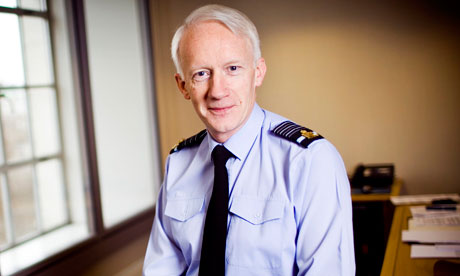RAF stretched to limit, air chief warns
Exclusive: Air Chief Marshal says it can cope with planned six months in Libya but extra cash required in 2014-15 review

The head of the RAF has issued a blunt warning that the service will need "genuine increases" in its budget over the coming years if it is to continue running the range of operations ministers demand.
In an interview with the Guardian, Air Chief Marshal Sir Stephen Dalton said he was trying to protect the core of the RAF during a turbulent period of spending cuts and redundancies, but insisted ministers would have to sanction proper reinvestment.
With the RAF playing an important role in Libya, where bombers, fighter jets and surveillance aircraft have all been involved over the past fortnight, he admitted the service was now stretched to the limit.
Dalton, 57, said the RAF was planning to continue operations over Libya for at least six months. His assumption is that planes will be needed "for a number of months rather than a number of days or weeks".
His warning comes amid renewed signs that key figures in Muammar Gaddafi's regime are seeking an end to the crisis. The country's deputy foreign minister, Abdul Ati al-Obeidi, flew to Greece on Sunday using the same route out of Libya as his former boss, Moussa Koussa. It was suggested he was in Athens to bring new proposals for a ceasefire or discuss the terms of Gaddafi's departure.
Even as the Libyan conflict continues, the financial difficulties faced by all three British armed services will be underlined on Monday when the army and the Royal Navy set out their redundancy programmes, despite calls from former service chiefs and Labour that the schemes should be shelved because of ongoing operations in north Africa and Afghanistan.
Dalton accepted the need for reform, but made clear that the RAF would need an "uplift" in spending.
"The key factor is that if we are to meet the requirements laid upon us, there is no question that more investment will be needed to achieve that. What I am seeking to do is maintain core competencies and bricks on which we can then build the future."
Dalton said extra cash was needed long before 2020, which is the target set by government for a wholesale revamping of UK defence strategy, and he claimed prime minister David Cameron had acknowledged this requirement.
"It needs to happen from the next comprehensive spending review, 2014-15. If at that point the economy has recovered as the government is predicting it should, they can then start to reinvest in some of the future capabilities we will need," said Dalton.
Without "genuine increases", the RAF would find it "very difficult to maintain levels of capability".
"On current planning, we can continue in Afghanistan, the Falklands and Libya with what we have got. But that does bring you nearer the point that you have just about exhausted the bag. It's a heck of a lot to be doing at one time," Dalton said.
The first of the service chiefs to speak out about the current funding crisis, Dalton dismissed outright any suggestion that the RAF might be merged with the army or the navy to save money and said it was inconceivable that the RAF would ever want to scale back and lose its global reach.
He also acknowledged that morale had been affected by a massive reduction in the Ministry of Defence's budget – 8% in real terms.
"People do feel concerned. Of course they feel concerned, they have a professional pride in what they do. They don't join the RAF as if they are joining a bank or an insurance company. They join the RAF because they want to be part of something that does something much bigger and better and, most importantly, has some meaning and value for everyone," Dalton said.
"So of course they are concerned. The world has become a very much more unstable place and again we have seen that in the last few days.
"They also think there is a need to make sure the government, the public, understands what they do, and understands that they are prepared to do these things provided what they do is recognised."
Dalton was appointed chief of the air staff in July 2009 and is overseeing one of the most radical overhauls in the history of the service. In last year's strategic defence and security review, ministers set out proposals to cut 17,000 jobs from the armed forces – 7,000 from the army and 5,000 each from the RAF and the navy.
The MoD believes a 6,000 cut can be achieved by not replacing people who have left, but that still leaves another 11,000 jobs to axe.
The RAF set out its redundancy programme last month. It is to close its base at Kinloss in Scotland and withdraw two squadrons of Tornados in the summer.
The remains of the Tornado fleet was thought to be vulnerable as the MoD has a £1bn overspend to cover from last year's budget alone. But it is now assumed that the Treasury would not dare push for the rapid withdrawal of the ground attack aircraft because they have been so instrumental in the campaign against Gaddafi. Eight Tornados and 10 Typhoons are currently in Italy, helping to secure the no-fly zone.
Dalton said the Nimrod R1, which was due to be scrapped, had been reprieved for as long as it was needed in Libya.
No comments:
Post a Comment